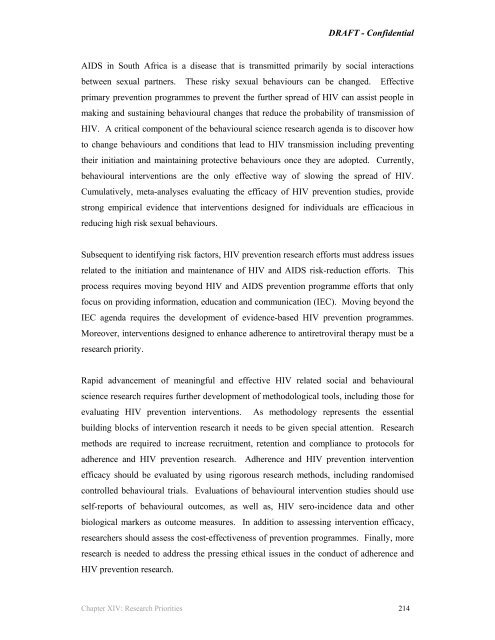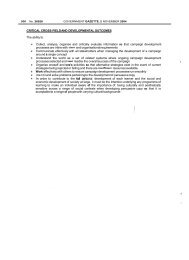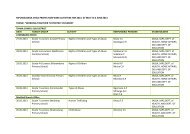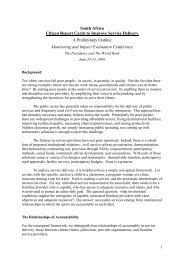Operational plan for comprehensive HIV and AIDS care and ...
Operational plan for comprehensive HIV and AIDS care and ...
Operational plan for comprehensive HIV and AIDS care and ...
You also want an ePaper? Increase the reach of your titles
YUMPU automatically turns print PDFs into web optimized ePapers that Google loves.
DRAFT - Confidential<br />
<strong>AIDS</strong> in South Africa is a disease that is transmitted primarily by social interactions<br />
between sexual partners. These risky sexual behaviours can be changed. Effective<br />
primary prevention programmes to prevent the further spread of <strong>HIV</strong> can assist people in<br />
making <strong>and</strong> sustaining behavioural changes that reduce the probability of transmission of<br />
<strong>HIV</strong>. A critical component of the behavioural science research agenda is to discover how<br />
to change behaviours <strong>and</strong> conditions that lead to <strong>HIV</strong> transmission including preventing<br />
their initiation <strong>and</strong> maintaining protective behaviours once they are adopted. Currently,<br />
behavioural interventions are the only effective way of slowing the spread of <strong>HIV</strong>.<br />
Cumulatively, meta-analyses evaluating the efficacy of <strong>HIV</strong> prevention studies, provide<br />
strong empirical evidence that interventions designed <strong>for</strong> individuals are efficacious in<br />
reducing high risk sexual behaviours.<br />
Subsequent to identifying risk factors, <strong>HIV</strong> prevention research ef<strong>for</strong>ts must address issues<br />
related to the initiation <strong>and</strong> maintenance of <strong>HIV</strong> <strong>and</strong> <strong>AIDS</strong> risk-reduction ef<strong>for</strong>ts. This<br />
process requires moving beyond <strong>HIV</strong> <strong>and</strong> <strong>AIDS</strong> prevention programme ef<strong>for</strong>ts that only<br />
focus on providing in<strong>for</strong>mation, education <strong>and</strong> communication (IEC). Moving beyond the<br />
IEC agenda requires the development of evidence-based <strong>HIV</strong> prevention programmes.<br />
Moreover, interventions designed to enhance adherence to antiretroviral therapy must be a<br />
research priority.<br />
Rapid advancement of meaningful <strong>and</strong> effective <strong>HIV</strong> related social <strong>and</strong> behavioural<br />
science research requires further development of methodological tools, including those <strong>for</strong><br />
evaluating <strong>HIV</strong> prevention interventions. As methodology represents the essential<br />
building blocks of intervention research it needs to be given special attention. Research<br />
methods are required to increase recruitment, retention <strong>and</strong> compliance to protocols <strong>for</strong><br />
adherence <strong>and</strong> <strong>HIV</strong> prevention research. Adherence <strong>and</strong> <strong>HIV</strong> prevention intervention<br />
efficacy should be evaluated by using rigorous research methods, including r<strong>and</strong>omised<br />
controlled behavioural trials. Evaluations of behavioural intervention studies should use<br />
self-reports of behavioural outcomes, as well as, <strong>HIV</strong> sero-incidence data <strong>and</strong> other<br />
biological markers as outcome measures. In addition to assessing intervention efficacy,<br />
researchers should assess the cost-effectiveness of prevention programmes. Finally, more<br />
research is needed to address the pressing ethical issues in the conduct of adherence <strong>and</strong><br />
<strong>HIV</strong> prevention research.<br />
Chapter XIV: Research Priorities 214
















